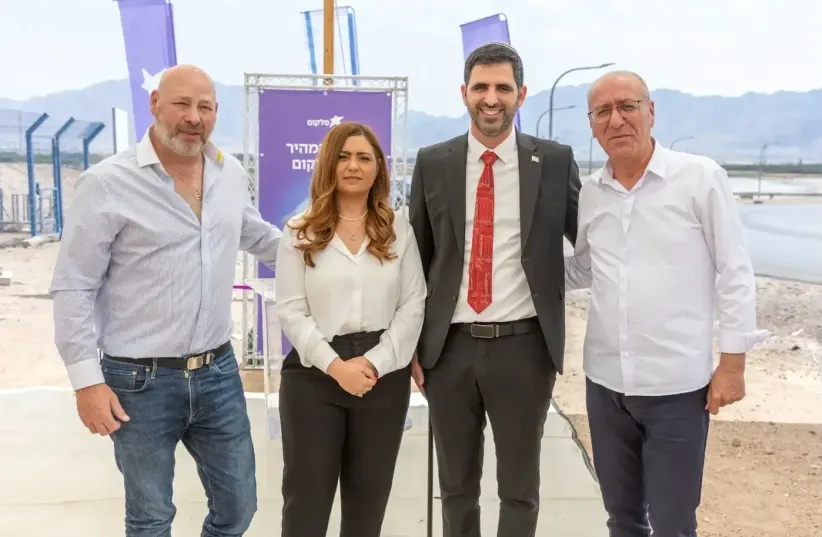In response to threats of submarine fiber optic disconnection in the Red Sea region, Cellcom unveiled today a new fiber optic network in the southern region up to Eilat. The launch event, attended by Minister of Communication, Dr. Shlomo Karhi, Ministry of Communication CEO Inbal Mashash, Eilat Mayor Eli Lankri, and Cellcom CEO Daniel Sapir, showcased the new network enabling connectivity from the east to Europe in the west. As part of the project, Cellcom laid out an optical network spanning 250 km to Eilat, providing an alternative for submarine cable owners and leading communication bodies worldwide to the Suez Canal route, currently exclusive for connecting the east and west.
The new network extends to the Jordanian borders from the north to the south, essentially expanding Cellcom's existing network across the country, allowing for server farms and landing stations' connection in strategic locations along the new fiber optics. Additionally, the network offers the opportunity to enhance connectivity speed for residents of the south and Eilat, providing communication stability to Israel. With the launch, Cellcom announced upgrades to its business customers in the city to the new fiber network.
The infrastructure is expected to serve international content providers, cloud operators, various communication operators, and entities interested in survivability to their existing infrastructures, turning Israel and the land connection Cellcom offers into a central hub for high-speed data transmission and a crucial junction for global communication traffic. Cellcom's land connection solution addresses various challenges faced by major international clients today, including the significant threat of cable cuts, as experienced last February.
The uniqueness of Cellcom's new network lies in the type of fiber deployed, made of Corning glass known for its quality and ability to transmit higher speeds over longer distances - thousands of gigabits over hundreds of kilometers. Cellcom will be the first and only company in the country with a fiber network composed of the most powerful and advanced fiber available in the communication market today.
Minister of Communication, Dr. Shlomo Karhi, stated, "The advanced land fiber deployment by Cellcom between Eilat and Be'er Sheva, allowing for a secure land connection between Asia and Europe bypassing the submarine communication cables in the Red Sea, is an additional contribution to the response to threats in the region. In this exceptional case, the security response also brings significant consumer benefits, such as increased competition in the international communication market and investments in Israel as a global communication center."
Eilat Mayor Eli Lankri added, "I congratulate Cellcom on connecting residents of Israel to international optical fiber and providing quality, fast, and stable communication through the city of Eilat. Strength to the Minister of Communication - Dr. Shlomo Karhi and his ministry's CEO - Inbal Mashash, for promoting this important initiative, which is truly significant for the residents of Eilat. Leveraging one of Eilat's greatest relative advantages, its geographical location as a bridge between east and west, Eilat once again proves to be a strategic asset for the State of Israel."
Inbal Mashash, CEO of the Ministry of Communication, commented, "The launch of Cellcom's new fiber network will contribute to Eilat and the south of the country, providing a secure infrastructure connecting between the east and the west. Today's deployment is a significant milestone for many players in the ecosystem who will benefit from high-speed data flow. The deployment turns Israel into a strategic asset and a central hub for global terrestrial data traffic. Our role at the Ministry of Communication, led by Minister Dr. Shlomo Karhi, is to ensure that Israel has advanced communication infrastructure longitudinally and latitudinally, spread by as many companies as possible. Beyond the economic, political, and security implications of developing an alternative to submarine infrastructure, infrastructure development will improve connection speed for southern residents."
Daniel Sapir, CEO of Cellcom, stated, "The security need arising from the war has prompted us to expedite activities to promote the launch of the new fiber network, in order to provide large customers from Israel and around the world with a reliable, stable, and advanced terrestrial alternative with the highest quality and speed fiber, providing them with backup and security through a different path than the existing one. We at Cellcom attach great importance to a project that will help solidify the company's position as a leading communication infrastructure company in Israel and against the international market."
